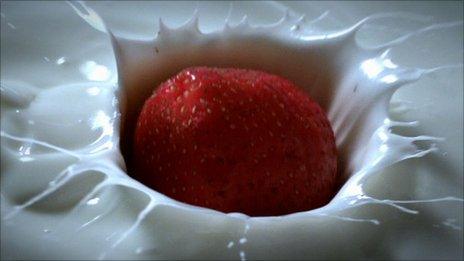Yoghurt and the functional food revolution
- Published

Adding fruit to yoghurt enabled producers to push up their profit margins
In half a century, the humble yoghurt has gone from hippy health food to mass market phenomenon, triggered a functional food revolution and become a multi-billion pound industry.
Yoghurt is the ultimate added-value success story, processing milk and selling it at a higher price.
"With some of these specialised, heavily packaged yoghurts, you are talking about profit margins over 15%, which manufacturers dream of," says Felicity Lawrence, journalist and author of Eat your heart out.
With seven out of 10 people in the UK regularly eating yoghurt, it has vast appeal. Add clever branding and marketing and you have a recipe for success.
A new market
Today yoghurt is revered as a functional superfood, claiming a number of health properties. But just 60 years ago, the yoghurt market did not exist. It was only really found in health shops.
But in 1963, Swiss-invented Ski was launched in the UK. With added sugar and real fruit it was an instant hit and launched a yoghurt revolution on our supermarket shelves.
"Ski undoubtedly changed yoghurt when it appeared on the market," says Sir Ken Morrison, chief executive of Morrisons between 1956 and 2008.
"It was really at the forefront of the development of the product."
Ms Lawrence agrees. "Adding sugar has been the process which has changed all sorts of bitter things into mass market products," she says.
Versatility
Over the years, manufacturers have taken advantage of yoghurt's versatility, adding all sorts of ingredients.
Every time an ingredient is added, a company can charge a higher price, a process known as added-value.
"Added value is where you take something that is a basic, cheap, raw commodity product like milk, and start processing it or packaging it or marketing it in a way that moves it up the chain so you can charge more for what you're doing," explains Ms Lawrence.
Foreign invasion
As well as the range and diversity, the other striking thing about the yoghurt aisle today is the number of foreign brands dominating the shelves.
Yoghurt production is both relatively simple and highly lucrative
In the late 1980s, German yoghurt-maker Muller saw an opportunity to move into the UK's growing market.
The Muller Corner transformed the yoghurt market, turning a traditionally healthy food into a sweet, luxurious treat.
"Muller packaged it as an outright treat," says food historian Bee Wilson.
"It opened up the market to a lot of consumers who wouldn't otherwise have seen themselves as yoghurt eaters."
Other European dairies followed and the yoghurt aisle soon became a continental affair. Today, two-thirds of yoghurt brands on UK shelves are owned by foreign companies.
Modern Food Revolution
People increasingly look to food to solve their health problems.
In recent years, companies have developed products with added ingredients claiming health and wellness benefits and creating an entirely new category of "functional foods".
And Yoghurt has been the revolutionary leader in the form of probiotics.
Probiotic yoghurts have specific strands of bacteria added in. It is claimed that these provide health benefits to the consumer.
Today more than half the households in the UK regularly buy probiotics.
But in 1996, when Japanese firm Yakult first launched in the UK, they were completely unknown.
Charging more for yoghurt is easier if it is seen as a healthy alternative to other food
"Yakult kind of arrived out of nowhere", says Ms Lawrence.
"Most people didn't even know what probiotics were.
"But it was part of this whole new category of ingredient, which have ended up being called functional foods."
French dairy giant Danone quickly realised the potentials of the little bottle of bacteria.
"Danone was probably the only company in the whole of Europe to see the potential of this whacky daily dose bottle," says industry analyst Julian Mellentin.
"So they quickly came up with their own alternative, which was called Actimel."
In just three years from its launch in 1997, Danone grew the UK probiotic market from £3m to £62m.
The probiotic market led a wider revolution in functional foods which has grown rapidly in the last 15 years and is expected to be worth £180bn worldwide by 2013.
Functional foods the answer?
As the functional food market grew and grew, its health claims went largely unchallenged.
But recently, under new European Union rules, these health claims have been put through rigorous scrutiny by the European Food Safety Authority (EFSA).
Although ongoing, the results have not been good.
None of the major probiotic claims have been given approval and companies may no longer be able to make health claims on their products.
Both Danone and Yakult have told the BBC that they support the principal behind the EFSA to regulate health claims and continue to discuss with the EFSA the science behind their products.
Despite these new regulations, the food industry continues to offer the consumer a wider variety of healthier options.
Industry giants that have not always been associated with healthy foods believe that this is where future profits lie.
"The consumer today is really looking for more healthy, more nutritious choices," says Richard Evans, president of PepsiCo UK & Ireland.
"Healthy nutrition is a door opener for wellbeing," explains Peter Brabeck-Letmathe, chairman of Nestle.
And it is the humble yoghurt that can be credited as being one of the major drivers of this trend toward health and wellness.
The Foods That Make Billions: Pots of Gold in on BBC 2 at 2100 on 7 December
- Published9 August 2010
- Published7 July 2010
- Published25 August 2010